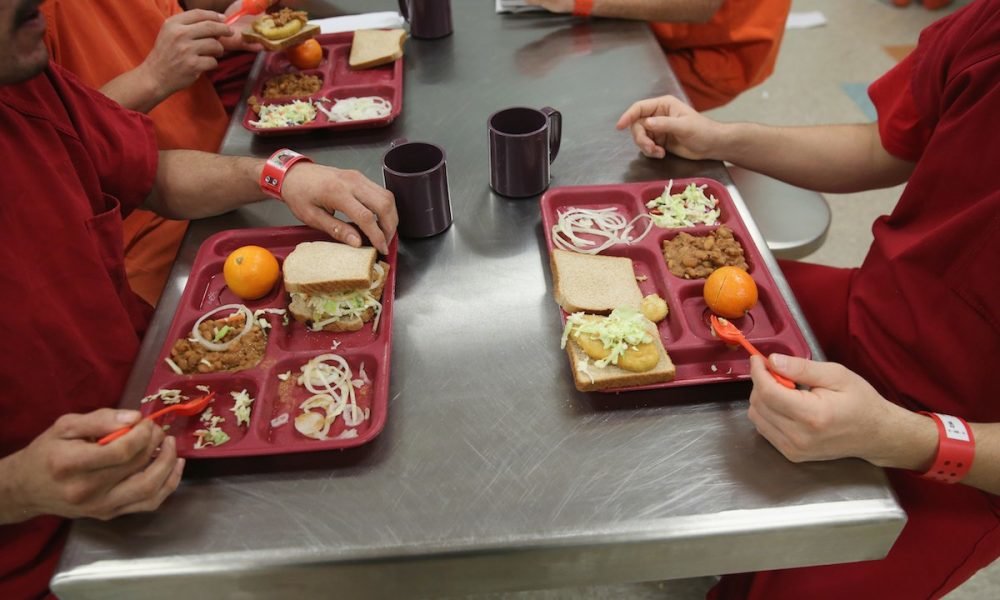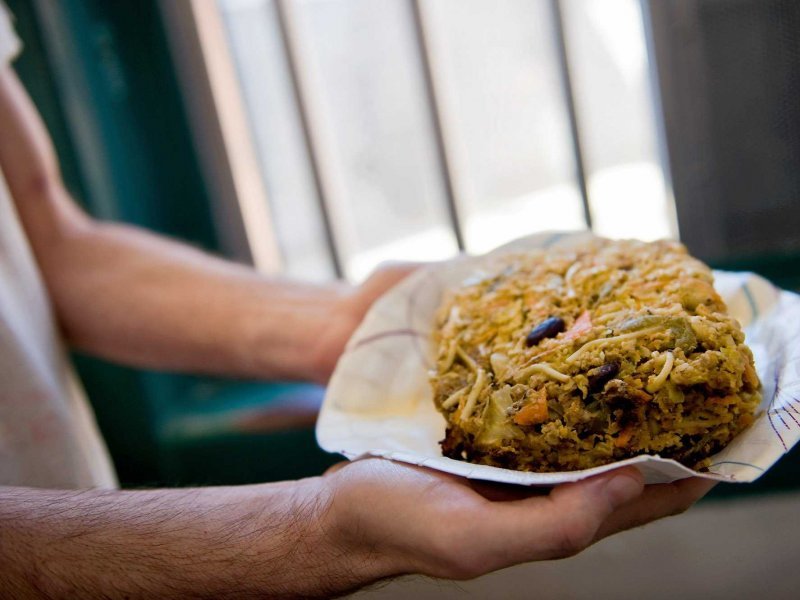
Research Says that Poor Nutrition is Causing Prisoner Re-offences

In America, we imprison more than 2.3 million people. But what does our society expect of persons who committed crimes that warranted a prison sentence? Simply put; 1) the individual is to be re-educated; 2) the offender to become contributing and constructive members of society in a meaningful way; and 3) the offender to construct a support system that ensures success in society upon release. And yet, none of this can happen, if the inmates we wish to see transformed are given nutrition-deficient meals and diets.
On Prison Food

Every individual knows that balanced diets are vitally important to maintain sustained emotional wellbeing and good health. It is also a great social pleasure of civilized life. But, too many people in prisons are constrained to consume a poor diet, which sadly lacks nutrition. Research suggests that over 50% of food items purchasable in UK and US prisons are high in sugar and/or fat. In USA, prison food has been termed as joyless, scant, and extremely unpalatable. But it isn’t necessary that it has to be this way. Italy’s Sant’Angelo dei Lombardi is counted among the best-fed penitentiaries across countries, where prisoners themselves grow organic vegetables and fruits and are even said to leave as healthier versions of themselves than when they were first admitted.
Poor nutrition has an impact on learning and concentration and could result in incidents of aggressive or violent behavior. In prison, this unhealthy diet also contributes to increase in poor physical and mental health of prisoners, when you compare it with the general population. To handle this issue, a relatively new government strategy hopes to give the prisoners, young and old, healthy eating advice, when they arrive at the prison. Inmates less than 21 years in age, are provided nutritional guidance and make learned choices regarding their daily diets.
Poor Diet- Aggression and Impulsive Behavior

The nutritional value and amount of food in prisons and the dietary choices which are made by the inmates, has a significant part to play in the quality of his or her life. Consuming sugary and over-processed foods may give rise to sudden ups and downs in the blood glucose levels of a person leading to fatigue, insomnia, irritability, dizziness and puts the person at risk for depression, especially men. Studies verify that a wholesome foods diet offers protection against depression. Deficiencies in essential minerals and vitamins can push up the number of health issues. Low levels of zinc, iron and magnesium can lead to low moods more anxiety, and poor concentration, resulting in sleep disturbances and attention deficits. Fatty Oils rich in Omega 3 are needed to improve cognitive functioning.
Recent administrative policies have acknowledged the problem of high sugar content and additives in food, and move to address the use of colorings, which are found to have detrimental effect on hyperactivity and behavior. Recently the UK government intervened in the buying decisions of the youth by outlawing the sale of energy drink to those under 16 years of age.
The problems, which arise out of a poor diet; such as attention deficits, aggression, and hyperactivity can easily, lead to impulsive behavior. Studies show that a heightened level of impulsivity are liked to high levels of offending.
Addressing the Issue – The UK example

A freelance journalist, Lucy Vincent, has a background in both fashion and food, started a campaign to bring better food to UK prisons as she is of the opinion that decent nutrition can positively impact health, learning, development and self-esteem. The younger crowd in prison has struggled with such issues and ensuring a wholesome diet is definitely a crucial step for improving emotional health and mental wellbeing.
Obvious difficulties exist in improving collective diets, particularly of young offenders. For instance, Public Health England indicates that to provide a balanced diet costs the government £5.99 per person, a day. But some reformatories have very stringent food budgets, which can be as low as £1.87 per person, a day. There is an obviously shortfall of money, but offering a balanced diet for younger offenders would become an expensive exercise, especially when other components of prison service are deprived of funds.
With seasoned penitentiary officers leaving the service in USA and their remaining colleagues objecting the intolerable levels of violence, the matter of improving the prisoners’ diets may not even feature on the government’s ‘To Do’ list. But to break the vicious cycle of reoffending, respect for basic human rights and the basic needs of prisoners with respect to adequate nutrition, must be met. Prisoners need healthy food if they have to stay healthy in jail.
More in Health & Fitness
-
`
Unveil Your Festive Radiance With Expert-Approved In-Salon Treatments
Are you ready to embrace the upcoming festive season with a radiant glow that turns heads and steals the spotlight? While...
March 10, 2024 -
`
The Key Nutrients For Your Health & Where You Can Find Them
More than ever before, today it is easy to fall into dietary habits that neglect the fundamental nutrients our bodies crave...
March 3, 2024 -
`
Everything You Need to Know About Malar Edema
In the quest for youthful radiance and the perfect cheek contour, many of us have ventured into the realm of cosmetic...
February 19, 2024 -
`
Make The Most Out of Your Mexico City Trip By Trying These ‘Can’t-Miss’ Experiences
Mexico City, alive with history, art, and gastronomy, invites travelers to immerse themselves in its vibrant spirit. If you find yourself...
February 15, 2024 -
`
Unlock the Secrets of Your Skin: A Comprehensive Guide to Understanding Your Skin Type
Embarking on a journey towards healthier, happier skin begins with unraveling the mysteries of your unique skin type. Beyond the one-size-fits-all...
February 11, 2024 -
`
The Pros & Cons of Treadmills and Cross Trainer Aerobic Gym Equipment
Aerobic exercises are the cornerstone of any fitness regimen. W, and when it comes to indoor equipment, the treadmill and cross...
February 3, 2024 -
`
Exploring the Global Hotspots for Cosmetic Transformations
Have you ever found yourself lost in the mesmerizing world of plastic surgery transformations late at night? Those videos showcasing Turkish...
January 26, 2024 -
`
Hate the Cold New York City Weather? Check Out These Warm Getaways
Are you tired of the chilly weather and eager to soak up some sunshine without breaking the bank? Well, fret not!...
January 16, 2024 -
`
Mineral Sunscreen & Chemical: What is the Difference?
Imagine you are on a serene beach. The sun is shining, and you are about to apply sunscreen. You reach for...
January 10, 2024















You must be logged in to post a comment Login